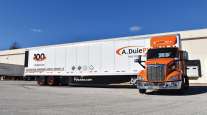Senior Reporter
Trucking For-Hire Sector Grew by 37.8% From 2009-2016, DOT Statistical Report Says
The trucking for-hire sector grew by 37.8% from 2009-2016, and was No. 1 among transportation groups in contributing to the 2016 gross domestic product, according to a new U.S. Department of Transportation statistical report.
Made public in January, the 124-page DOT Bureau of Transportation Statistics 2017 report on economic trends in the transportation industry features updated data and new content as well as new material on transportation productivity measures and how the transportation sector has contributed to economic growth in the U.S.

Rail intermodal grew the fastest among the freight modes in the bureau’s transportation services index, rising 50.6% from June 2009 to December 2016. Competitive pricing, track upgrades, and investment in rail intermodal terminals and other infrastructure contributed to the rapid growth of rail intermodal traffic, the report said.
“Trucking grew the second fastest at 37.8%, followed by pipeline at 29.6%, waterborne at 23.2%, and air freight at 21.7%,” the report said.
However, the top contributors to GDP by mode in 2016 included trucking ($150.1 billion, 0.81% of GDP), other transportation and support activities ($122.8 billion, 0.66%), and air ($105.4 billion, 0.57%).
Overall, transportation modes — ranging from warehousing and storage, pipelines and water to transit, ground passenger and rail — ranked 13th among each of the 17 industries in its contribution to GDP. Those 16 other industries range from finance, government and manufacturing to construction, mining and utilities.
The median wage for heavy and tractor-trailer truck drivers in 2016 was $41,340, the report said.
“This ranking, however, understates the importance of transportation for two reasons. First, it includes only the contribution of for-hire transportation to GDP. In addition to purchasing for-hire transportation services, many industries produce transportation services for their own use,” the study said.
“Second, the ranking does not capture the extent to which industries rely on transportation. Each industry uses roadways, shipping channels, rail lines and other transportation infrastructure to access supplies and customers, and workers in each industry use transportation to reach their workplace.”
The report said that truck transportation is the largest subsector of the transportation modes sector when it comes to hiring, employing 29.2% of the 4.9 million for-hire transportation employees in 2016. Truck transportation employment grew by 29.5% between 1990 and 2016, to 1.5 million employees from 1.1 million employees, with significant fluctuations related to major economic events such as Sept. 11, 2001, the “great recession,” and other economic recessions.
Truck transportation employment grew by 29.5% between 1990 and 2016, to 1.5 million employees from 1.1 million employees.
But many workers in transportation-related jobs are not included in employment data for transportation industries because they work for non-transportation firms.
The largest transportation-related occupation is heavy-duty truck drivers, the report said. In 2016, 1.7 million people worked as heavy-duty truck drivers, 858,000 worked as light-duty and delivery truck drivers, 515,000 worked as school bus drivers, and 426,000 were driver/sales workers, the report said.
In current dollars, compensation for workers in transportation and material moving occupations increased 46.6% from the first quarter of 2004 to the first quarter of 2017 — from $19.74 to $28.93. In comparison, wages for all occupations increased 41.4% — from $24.95 to $35.28. Low-wage transportation occupations, like truck drivers and household movers, account for a much larger share of the transportation workforce than high-wage occupations like airline pilots. As a result, the average compensation for transportation-related occupations is $6.35 per hour less than the average for all occupations as of the first quarter of 2017.
The median wage for heavy and tractor-trailer truck drivers in 2016 was $41,340, the report said.




